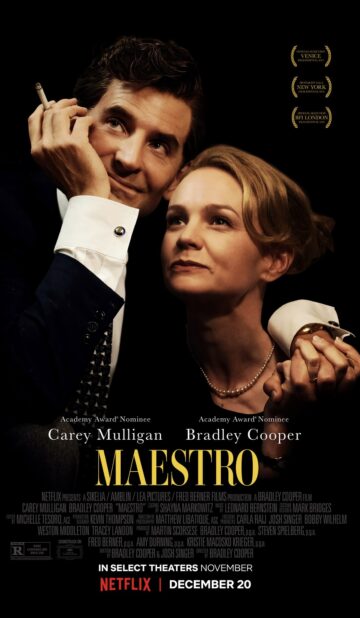The Reel Review
The life of legendary composer and conductor Leonard Bernstein is portrayed in this biopic co-written, directed by and starring Bradley Cooper. Carey Mulligan co-stars as Bernstein’s wife Felicia Montealegre, whose complicated, 27-year, unconventional marriage to the closeted gay composer resulted in a world of inner turmoil before her death from lung cancer in 1978 at the age of 56. Bernstein died in 1990 at the age of 72.

Shot first in retro black and white during the 1940s, with their later life portrayed in color, Maestro is a very artsy, lyrical character portrait of the late artist with some capital A acting from Cooper, who dons a prosthetic nose to look more like Bernstein. (It works – he really does.) Unfortunately, despite the technically dazzling cinematography, excellent performances from Cooper and Mulligan, and makeup from Kazu Hiro (Bombshell, Darkest Hour), there is a distance to Cooper’s story – we never get to experience Bernstein as an actual person. He is always “on.”

Itself structured like a grand symphony, Maestro is a visually sumptuous but predictable epic that would have been better had it taken the same artistic chances that made Bernstein such a musical icon. Glossing over Bernstein’s many artistic achievements and serious relationships with men also adds to the chief complaint of the montage and cigarette smoke-heavy film – that it is more style than substance.
REEL FACTS
• Martin Scorsese and Steven Spielberg, both producers on the film, were initially slated to direct Maestro, until Bradley Cooper showed them A Star is Born. After the “Shallow” scene, Spielberg walked over to him and said, “You’re directing Maestro.”

• Maestro won the rights to Bernstein’s music instead of Cary Joji Fukunaga’s Bernstein biopic, which would have starred Jake Gyllenhaal.
• Carey Mulligan dropped out of plans to appear in the 2023 AppleTV+ film Fingernails due to filming Maestro. Mulligan was 12 weeks pregnant during filming.




I watched the movie last night on Netflix and thought about the generations) of gay men who married women because it was the socially acceptable thing to do. Many of these men continued to have closeted sexual relationships with other men throughout their marriages while the wives managed to look the other way. Such duplicity was a sad testament of a society where conventionality was more important than happiness. I have known several of my parents’ generation who lived this lifestyle and I found it to be a tragic consequence of social pressure of the period. The movie was absolutely stunning in both acting quality and cinematic effect but left me feeling deeply saddened for all concerned. As a period piece it was perfection down to the most minute details. Both Mulligan and Cooper deserve academy awards for their performances in my opinion.